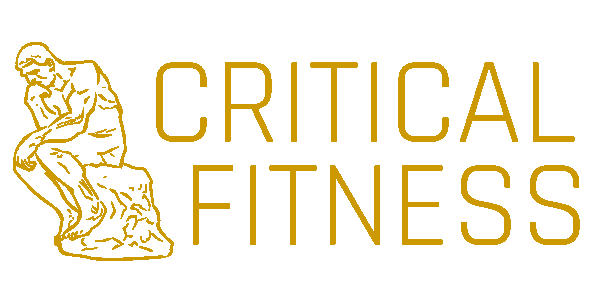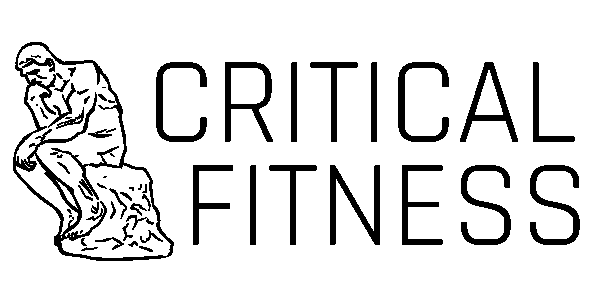There are gyms on every street corner these days, and personal trainers in every gym. But would you know a good trainer from a bad one?
Many trainers are trying to be different from their competition and stand out from the crowd. And there are trainers with different levels of education, experience, and knowledge. So you might get conflicting information from two different trainers, then try to work out which to trust.
One might want you to lift heavy barbells, while the other wants you doing interval training. One wants you eating keto, while the other wants you going vegan. And they might both think the other trainer is a complete idiot.
As a member of the public, who should you trust? Who should the impressionable new trainer look up to? And as an experienced and highly qualified veteran of the industry, what makes you die a little on the inside?

An actual image of me listening to an industry colleague
We divert from our usual content on this site to give you an opinion piece. Here we compare the bad trainer to the good trainer. The bad trainer may not meet all the criteria I outline below, but he* will definitely tick a few boxes on this list!
For a start, he won’t call himself a personal trainer
There are a hundred variations of this. “I’m not just a personal trainer”, the bad trainer protests with a hint of disdain. “I’m a ‘holistic health coach’. Or maybe a “functional movement specialist”. Or an “alternative wellness and lifestyle expert”.
But there are two problems with this. Firstly, these titles don’t mean anything. They’re made up, and may not be an accurate reflection of their skills. And secondly, if your qualification is in personal training, aren’t you just a personal trainer?
In fact, what right do you have to call yourself anything but a personal trainer? If you don’t want to be a personal trainer, go earn the right to call yourself something else. Get another qualification. Go to university. Anything.
But isn’t it ok to be just a personal trainer? The bad trainer doesn’t think so. He wants to stand out from the crowd by being a “holistic physical empowerment coach”.
A good trainer owns the title “personal trainer” and isn’t pretending to be something else. After all, that’s what their qualification is in. There’s no shame in being just a personal trainer if you’re really good at it.
A bad trainer says “his body is his business card”, and not as a joke.
That’s right, the bad trainer thinks that looking as good as he possibly can is his way to attract clients. And this will probably work for some. But that’s a sad indictment on how shallow we are as people, not an indication that this guy is a great trainer.
Of course, he works hard to maintain his appearance. But that doesn’t mean he’s as strong, mobile, healthy, aerobically fit, and pain-free as any other trainer. You know, all those other benefits of exercise!
He also claims a lot of credit for essentially winning a genetic lottery. The lean, thin trainer next to him could train just as hard, but not respond to hypertrophy training the same way. The trainer with slightly higher levels of body fat could have a family history of obesity (with the complex combination of social, demographic, and genetic factors that contribute to that).
And it doesn’t mean he’s any more knowledgeable than a trainer that looks different. Despite that, research suggests the appearance of a trainer plays a role in establishing trust from the client. To what extent is not clear, but it’s not an equal playing field for trainers.

There’s nothing that tells you this trainer will be more effective for their client than any other trainer.
A good trainer exercises, and sets a healthy example, as well as they can for their individual set of circumstances. But maybe they are successful despite their appearance, not because of it.
The overweight trainer could be lazy and ill-disciplined, but they could be a great trainer, because they can attract and retain clients while not looking like the other guy.
When working as a trainer myself, my main source of new clients was people who were watching me train a client. They came to me not because of the way I looked (thankfully!), but because of the service I provided.
If the good trainer is attentive to their clients, and trains them well, then new clients will come.
A bad trainer only did a course because he “needed the piece of paper”…
This guy already knows his stuff. After all, he’s been training for years, and he’s done a lot of research online. So, he didn’t really need to do a personal training qualification.
But it looks good on the resume, and many employers and insurers ask for it, so he did it just to meet these expectations. He didn’t expect to learn anything, and so of course he didn’t.
We see this all the time in the courses I teach. If someone comes into a course not expecting to learn from us, I can assure you they won’t! They do the least work possible, go into industry, then do whatever they wanted to in the first place.
Whatever injury, medical condition, or special need you have, flip a coin. Maybe he knows how to help, maybe he has no idea!
A good trainer wanted to learn. Even with a great history of exercise and extra learning, they could still pick up something from their course. Their qualification wasn’t about the piece of paper, so much as the knowledge gained, and the skills developed.

Not only is your qualification a chance to learn, it’s a chance to develop professional skills, make your mistakes in a safe environment instead of the workplace, and develop contacts for the future.
…but he also doesn’t do any professional development
If he already knows more than the instructors in his course, then what could a conference teach them? What benefit does he get from mixing with other trainers, or professionals from other fields helping to bridge the gaps between their professions?
With that attitude, clearly nothing. If it didn’t come from the narrow range of sources he was exposed to early in his fitness journey, he isn’t interested.
At best, he might get some information from another trainer. The guy that’s bigger than him, or leaner, or who has more clients. And who knows how good that information will be? We know trainers aren’t necessarily great sources of knowledge. For example, they don’t test any better than the general public in some areas of nutrition!

A qualification is the beginning, not the end, of your learning journey
A bad trainer doesn’t register with a professional body
No professional body is perfect. Trainers might resent the cost, or the registration process, or think the services they offer aren’t helpful. And all that’s OK.
The bad trainer (among many other faults) has never registered with the professional body, and has opinions that are either outdated, or were incorrect to begin with. In fact, he might not even know what they do. But he’s happy to share his opinion at every opportunity. I’ve heard them all:
“They don’t have any regulatory power, anyone can be a trainer these days”
“The professional development is bullshit, you don’t learn anything”
“You don’t get anything for your money”
But you know what’s worse than a weak industry peak body? No industry peak body at all. Surely the path to improving the standard of the fitness industry does not include a free-for-all, with no professional standards, and no guidance for the consumer?
A good trainer might be critical of the professional body, but that doesn’t mean they aren’t involved. They can nominate for governance positions. Or they can provide feedback and push for change. I’ve been a critic before, but I also recognise the importance of these bodies.
Our industry peak bodies have never worked harder than they have during the COVID-19 pandemic. I’ve seen firsthand both Fitness Australia and the Exercise Association of New Zealand go above and beyond to keep members informed, and represent the industry to their respective governments, during the crisis.
A bad trainer puts down other trainers when trying to attract clients
Gyms can be competitive. I’ve had to compete for clients too, so I get it. But the bad trainer will criticise other trainers in their pitch to clients. They might put down their appearance, knowledge, qualifications, or the results they get.
A good trainer recognises that criticism is important, particularly if the scope of practice is being exceeded, or if there’s a risk of injury. In fact, it’s their duty as a responsible professional to say something. But badmouthing a trainer in front of a potential client just because you think you are better is a different story.
And as mentioned above, a good trainer lets their work speak for themselves. If your work is better than the trainers you compete with, you will gain more clients. And if your work meets the specific needs of the client, you will gain that client too. There’s room for all of us, with our different (evidence-based) training approaches.
Not only that, he puts down other professionals
Got an injury? Don’t worry, the bad trainer can fix it. Physiotherapists are a waste of time, with their little band exercises and nonsense.
Not losing weight? Don’t see a dietitian, they just preach about guidelines, and moderation. The bad trainer has a pre-written meal plan ready to go that will shed weight in just a few days!
“National dietary guidelines? Please! What do those egghead scientists know about real life? They don’t know how to get shredded. In fact, I bet they’ve never lifted a weight in their life.”
The bad trainer has experience in the trenches, and he’s willing to tell you why that’s better than any book learning.
Doctor wants you to take medication? Forget about it. The bad trainer is fairly sure doctors just try to push pills and vaccines on you for profit. But he’s different. He takes a holistic approach to ensure good health without doctors and their financial agendas.
By the way, that’ll be $100 thanks. And buy these supplements.
A good trainer recognises how these other professionals can complement their service. We aren’t in competition with these people, we’re working together, to get the best outcome for the client.
In fact, we need them. The physiotherapist can help your client maintain exercise when an injury might stop them. The dietitian probably has a bigger impact on weight loss than our exercise program does.
A good trainer isn’t petty and insecure. They are collaborative, and aware of their limitations.

Controversial I know, but there’s a chance this guy knows more about his field than a personal trainer does.
He dismisses expertise
And why wouldn’t he? He’s got life experience, and results (for himself, at least). He also has a full year of education**, and turned up to quite a few of the classes in that year. Sometimes he even paid attention.
Compared to other professionals, and he’s barely learnt to walk and wipe his butt. Physiotherapists study for four years at a much higher level, and so do clinic exercise physiologists, with a bunch of practical hours and professional development on top of that. Dietitians do five years. Academics, up to 10 years depending on their path.
But if his advice contradicts theirs… he falls back on “experience”, and “real life” as if these others aren’t people, and aren’t all practitioners themselves.
Or even worse, he argues that he’s “ahead of the science”, or tries to critique research. This never goes well, but the bad trainer lacks the knowledge to realise when he’s making a fool of himself.
A good trainer realises that dismissing the expertise of others just highlights your own flaws, biases, and insecurities. I’ll say it again: it’s OK to be just a personal trainer, if you’re trying to be a good one.
A good trainer also realises that some internet reading is not “research”. And to dismisses someone else’s decades of learning and experience based on the YouTube videos you’ve watched is breathtakingly stupid.
Finally, a good trainer realises that without a research degree, they may not know how to read research well. So talking about a new piece of research should be done with extreme caution.
A bad trainer doesn’t understand what he criticises
This follow directly from our point above. A bad trainer can’t recognise his own lack of expertise.
He dismisses nationally endorsed dietary guidelines, based on the work of dozens of experts and up-to-date research, because of some cherry-picked criticisms. But he’s never actually read the guidelines, or the evidence underpinning them. Why would he when he already knows they’re wrong?
Or he finds a single piece of research to justify his style of training, or preferred pattern of eating, and proclaims it the ground-breaking, or game-changing. But he’s dismissive of the 20 other well-designed studies that contradict it (if he’s even aware of them).
Even worse, in this era of conspiracy theories, he’ll share a shitty YouTube video, from a fake expert, outside their field of expertise that five minutes of fact-checking would discredit. Then to sound fair and even-handed, says “interesting” as he posts it. It’s not interesting, it’s bias and ignorance.
A good trainer avoids providing an opinion when he isn’t qualified to. It’s OK to say “I don’t know”.

Online sources can be brilliant sources of information. But they usually only complement, rather than replace, a formal education.
A bad trainer puts everyone on their favourite diet.
“I suppose it is tempting, if the only tool you have is a hammer, to treat everything as if it were a nail.”
This saying refers to a cognitive bias known as “Maslow’s Hammer”. It’s on clear display in the bad trainer, with minimal nutrition education, and excessive confidence.
Not only will this diet likely be out of the fitness professional’s scope of practice, but it will be inflexible and unsustainable. You’ll lose weight, but it’ll be harder than it needs to be, and you’ll rebound when you go back to a more sustainable pattern of eating.
You see, the bad trainer doesn’t care about your preferences, or lifestyle. He’s a convert to the vegan-keto-raw-detox diet, so you will be too.
A good trainer recognises their preferences aren’t the same as everyone else’s. And what suits their lifestyle doesn’t suit everyone else. And preparing dozens of bland, identical meals to put in the freezer isn’t going to put everyone on the path to sustainable weight loss.
Instead, the good trainer works to educate, and provide options, within their scope of practice. They know there are different paths to the same outcome. They refer to others if they can’t meet their client’s needs. And they help the client focus on good health, rather than image, or a number on the scales.

Is your trainer a carnivore? Guess what? You are too!
You will train the way he likes to train.
Take it from me, when a bodybuilding 17-year-old walks into a fitness course, the last thing he wants to do is cardio. Or learn how to use a fitball. Group fitness. Stretching. Basically, anything that isn’t about getting massive.
It’s no surprise then that these guys often turn into the bad trainer. Guess what sort of exercise you are doing when you train with this guy? That’s right, lifting weights.
It could be because they didn’t listen to anything else. They’re fitting everything into their own preferences, maybe even without realising.
Weight loss? Sure, lift heavy weights. High risk of heart disease? Let’s lift weights. Back pain and stress issues? Let’s lift heavy weights. Can heavy weights help all these issues? Potentially. Are they the best solution, or the most appropriate for that client? Not always.
And if your trainer really prefers HIIT (high intensity interval training) circuits to steady state cardio training, you better hope you have a decent training history and no cardiac risk factors. Because guess what you’re doing every session?!

A good trainer can train like this guy, but still give you a great cardio workout, or help improve your mobility… or will refer you to someone who can.
A good trainer has more than one tool in their toolkit, and will select the right ones to meet the needs, and preferences, of the client. I can’t say this enough.
Or, recognising their own limitations, will refer you to another trainer. If someone comes to me for a style of training I have absolutely no experience in, I’m not going to just shrug, then give them the same training as everyone else.
A bad trainer can’t maintain a schedule
A bad trainer cancels sessions, moves you around, arrives late, and double books. He probably won’t last in the industry because clients will leave, or his fleeting attention span will be exhausted, and he moves to another career.
But you can bet when that other career goes badly, he’ll be back, and trying to chase up all his old clients for more sessions.
A good trainer treats their job like a profession, and they value the client’s time as well as their own. Sometimes life gets in the way, and sessions need to be moved, or cancelled. But this is rare, and they apologise.
A good trainer turns up even when their dog wanted to go outside four times during the night to pee, but didn’t, and just wanted to play with them instead (this may have happened to me before). And they don’t let it effect the quality of the training you receive.
A bad trainer makes claims about “boosting immunity”
In the past I dismissed this as a bit of nonsense that didn’t do a lot of harm, as long as people still listened to actual medical professionals. But this is especially important if you’re in the midst of… I don’t know… a global pandemic.
Despite not really understanding all the complex systems that make up your immune system, a bad trainer will still make comments about it. Definitive comments, about a food or supplement, for example.
They probably got this from a non-academic source, so there’s a fair chance this information is unreliable. And they probably don’t understand that when healthy we don’t want a stronger immune system, just one that’s strong enough.
Overactive immune systems are responsible for type I diabetes, and rheumatoid arthritis, to name just two examples. If it were even possible to boost our immune system as they want us to, we wouldn’t want to do it.
As usual, a little bit of knowledge is a dangerous thing. The bad trainer knows that having an insufficient diet, or compromised sleep, might increase our risk of infection. But they don’t know the limits of this approach, or the limits of their understanding.

“Detox” is a word you will probably never hear from the mouth of the good trainer.
If you are concerned that a trainer may be making claims health claims not supported by evidence, it can be hard to check. But this simple “Bullshit Detector” can help.
A good trainer does not make medical claims. They stay in their lane. And they certainly do not provide medical advice, which is what detoxing claims are, in a vague way.
He got his start on reality TV, and is trading on his reputation
It could have been The Biggest Loser, or some other dumpster fire ruining the reputation of our profession. He lost 40 kgs, now he’s here to show you that you can do it too.
But what did he learn on this show? The bad trainer learnt about starvation dieting, excessive volumes and intensities of training, ignoring injuries, and the inevitable rebound most participants experience when… amazingly… they find it hard to maintain their weight loss in a normal environment.
It turns out he didn’t learn a lot about moderation.
Now he’s selling cookie-cutter, online training programs, with Facebook groups for “support”. Or selling a book. Or working in a gym, charging more than he’s worth, trying to cash in.
He thinks that while he might he gotten a qualification, he learnt what to do on the show from the big-name trainers, so don’t worry what those lecturers and textbooks say. ***

Here we see the team from The Biggest Loser preparing for another training session with their captives… I mean, contestants.
A good trainer knows the difference between that environment, and real life. In fact, a good trainer preaches moderation and sustainability in everything they do.
Most people don’t need to train like they do on TV. And most people are not preparing for a physique competition, and need to be very lean in a set period of time. We can usually afford to take it slow. And if the good trainer came from this extreme environment, they are counselling against extreme approaches to all their clients.
A bad trainer reads this article, then thinks we’re talking about all those other trainers
He might read these words and dismiss me as an academic, looking down on hard working trainers from my ivory tower (never mind that I’ve been a working trainer for many years). Or say I’m bitter that I couldn’t make enough money as a trainer myself (I was successfully working full time as a trainer before moving into education).
Or he’ll think about those other trainers that really need to lift their games. After all, it’s easier to identify faults in others than yourself.
Or he will comment about how those dietitians really do have dietary advice wrong. Then he’ll direct me to a cherry-picked source, or anecdotal evidence, proving the point of this article in an instant.
A good trainer is capable of reflection, and may identify one or two things to think about from this article. And to get in before the inevitable criticism – I’m not immune to some of these faults too. In fact, a couple have been learnt from bitter experience.

Being a good trainer is a continual process of reflection and learning, like any job in a changing environment.
It was a few years into my fitness career before I realised that my qualification was a starting point, not a finishing point, in my education. I’ve spent my career since making up for that, and helping others avoid making the same mistake.
I’ve seen some of the other mistakes in colleagues, or students. And others still have been identified in research. But the more we can promote the good trainers, and improve or sideline the bad trainers, the better our clients’ outcomes, and the more respected our industry.
* I automatically imagine the bad trainer as male. Not sure why. Of course trainers can be brilliant, or terrible, regardless of gender.
** this is extremely generous. In Australia you could be a trainer in a matter of months, and in the US weeks.
*** thanks to our good friend Dr. Bill Sukala for this suggestion.



You hit the nail on the head!!! I love this article. A good trainer is adaptable, admits their faults, stays in their lane, and continues to educate themselves! Great job on this one.
Thanks for reading Alicia!
This sounds like somebody who has failed At training their own self…. your body is a business card. And it’s not just a few it’s a huge majority of clients would rather be trained by somebody who looks the park rather than somebody who is obese and out of shape. regardless of genetics if you’re obese then you have a problem and it’s unhealthy. PERIOD. but then again you know the saying those who can’t do teach….
Be nice John! I know it’s the internet, but really!
At different times in my career I’ve employed trainers, I’ve chosen trainers for my own exercise, and I’ve developed students into trainers. I am always more concerned about what the trainer knows, and how good their practical skills are, than how they look. If they look the part as well, they will probably find it easier to be successful, of course.
Fantastic piece! I spotted a couple of errors mentioned in the article that I had made over my career but fortunately; I corrected most of them before burning down my career and reputation.
But who’s this sad john? Must be someone who got traumatized reading about himself as one of the main characters in this article 😉 … (the one who thinks the article is about all the other trainers)
If I were still running the PT academy at my former workplace, I would have this article a mandatory read at the start of the semester! It would expose all the little johnnies in the cohort on the first day 😉
Thanks Arnar, I think we’ve all made one or two of these errors in our youth!